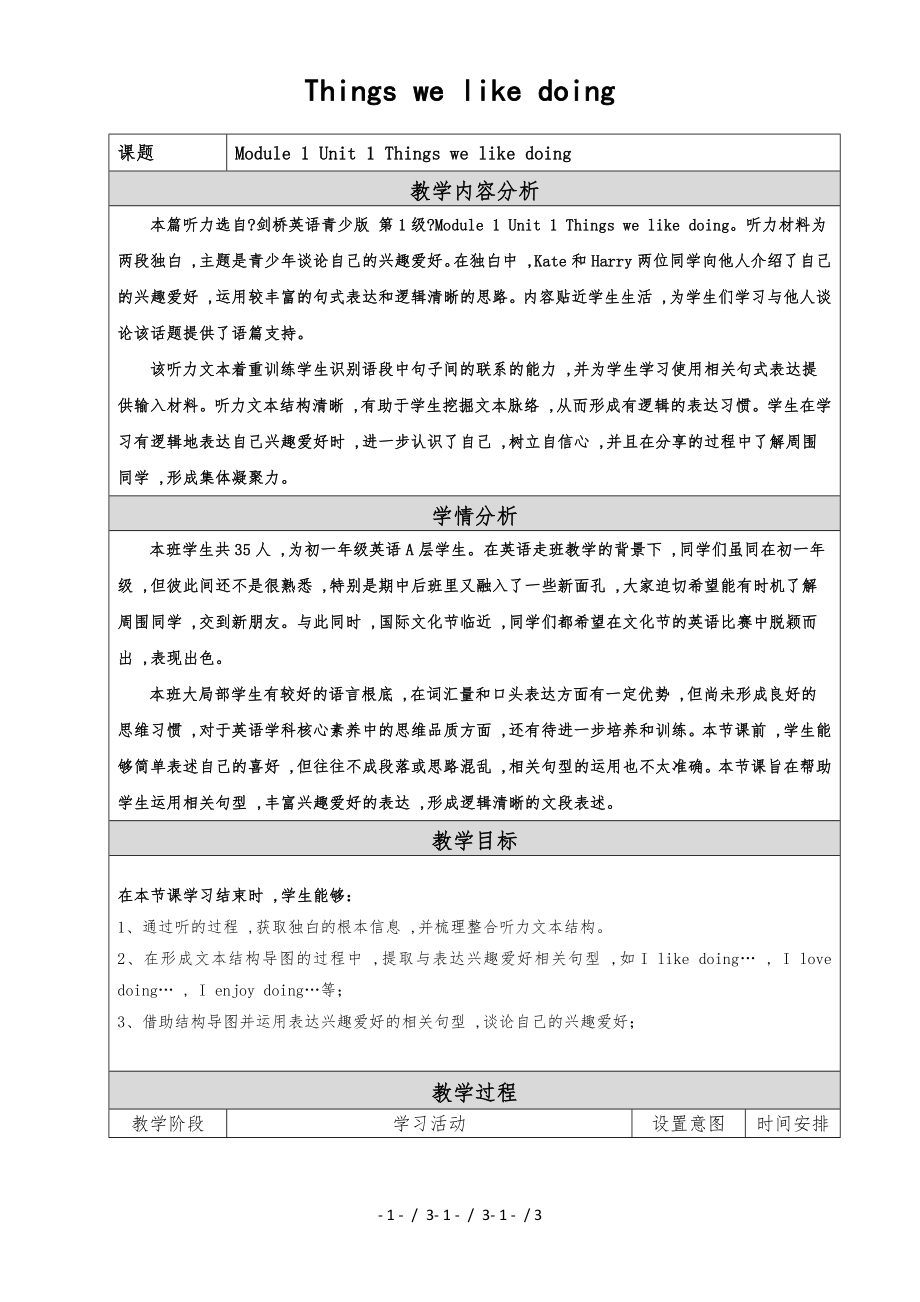《劍橋英語青少版 第1級Module1Unit 1 Things we like doing.教案》由會員分享,可在線閱讀����,更多相關(guān)《劍橋英語青少版 第1級Module1Unit 1 Things we like doing.教案(3頁珍藏版)》請?jiān)谘b配圖網(wǎng)上搜索��。
1、Things we like doing
課題
Module 1 Unit 1 Things we like doing
教學(xué)內(nèi)容分析
本篇聽力選自?劍橋英語青少版 第1級?Module 1 Unit 1 Things we like doing��。聽力材料為兩段獨(dú)白 ,主題是青少年談?wù)撟约旱呐d趣愛好����。在獨(dú)白中 ,Kate和Harry兩位同學(xué)向他人介紹了自己的興趣愛好 ,運(yùn)用較豐富的句式表達(dá)和邏輯清晰的思路。內(nèi)容貼近學(xué)生生活 ,為學(xué)生們學(xué)習(xí)與他人談?wù)撛撛掝}提供了語篇支持��。
該聽力文本著重訓(xùn)練學(xué)生識別語段中句子間的聯(lián)系的能力 ,并為學(xué)生學(xué)習(xí)使用相關(guān)句式表達(dá)提供輸入材料�����。聽力文本結(jié)構(gòu)清晰
2����、,有助于學(xué)生挖掘文本脈絡(luò) ,從而形成有邏輯的表達(dá)習(xí)慣。學(xué)生在學(xué)習(xí)有邏輯地表達(dá)自己興趣愛好時 ,進(jìn)一步認(rèn)識了自己 ,樹立自信心 ,并且在分享的過程中了解周圍同學(xué) ,形成集體凝聚力�����。
學(xué)情分析
本班學(xué)生共35人 ,為初一年級英語A層學(xué)生����。在英語走班教學(xué)的背景下 ,同學(xué)們雖同在初一年級 ,但彼此間還不是很熟悉 ,特別是期中后班里又融入了一些新面孔 ,大家迫切希望能有時機(jī)了解周圍同學(xué) ,交到新朋友。與此同時 ,國際文化節(jié)臨近 ,同學(xué)們都希望在文化節(jié)的英語比賽中脫穎而出 ,表現(xiàn)出色。
本班大局部學(xué)生有較好的語言根底 ,在詞匯量和口頭表達(dá)方面有一定優(yōu)勢 ,但尚未形成良好的思維習(xí)慣 ,對于英語學(xué)科核心
3�����、素養(yǎng)中的思維品質(zhì)方面 ,還有待進(jìn)一步培養(yǎng)和訓(xùn)練�。本節(jié)課前 ,學(xué)生能夠簡單表述自己的喜好 ,但往往不成段落或思路混亂 ,相關(guān)句型的運(yùn)用也不太準(zhǔn)確。本節(jié)課旨在幫助學(xué)生運(yùn)用相關(guān)句型 ,豐富興趣愛好的表達(dá) ,形成邏輯清晰的文段表述�����。
教學(xué)目標(biāo)
在本節(jié)課學(xué)習(xí)結(jié)束時 ,學(xué)生能夠:
1����、通過聽的過程 ,獲取獨(dú)白的根本信息 ,并梳理整合聽力文本結(jié)構(gòu)。
2����、在形成文本結(jié)構(gòu)導(dǎo)圖的過程中 ,提取與表達(dá)興趣愛好相關(guān)句型 ,如I like doing… , I love doing… , I enjoy doing…等;
3��、借助結(jié)構(gòu)導(dǎo)圖并運(yùn)用表達(dá)興趣愛好的相關(guān)句型 ,談?wù)撟约旱呐d趣愛好�;
教學(xué)過程
4、
教學(xué)階段
學(xué)習(xí)活動
設(shè)置意圖
時間安排
Stage 1
1. T presents a speaking contest to the class and help Ss prepare for it.
2. Ss listen to a classmate talking about his/her hobbies and guess the topic of the speaking contest.
創(chuàng)設(shè)情境 ,引出主題�����。激活學(xué)生背景知識 ,并引出學(xué)生當(dāng)前存在問題 ,形成學(xué)習(xí)期待。
3’
Stage 2
1. Ss listen to a teenage
5�����、r named Kate talking about her hobbies and fill in the blanks on the worksheet.
2. T discusses Kate’s introduction with Ss and draw a mind map on the blackboard.
獲取根本信息 ,了解文本結(jié)構(gòu)���。
10’
Stage 3
1. T plays the second part of the recording (Harry’s section) twice and ask Ss to answer the questions
6、 on the worksheet.
2. Ss work in groups to illustrate the structure of Harry’s introduction.
3. Ss share their mind maps with the class.
梳理整合文本信息 ,理清邏輯結(jié)構(gòu)���。
10’
Stage 4
1. Ss draw a mind map of their own hobbies and interests and share it in groups.
2. Ss in each group vote for the
7����、 most impressive one.
3. The winner of each group gives a presentation to the class. Other Ss give comments to it.
運(yùn)用所學(xué) ,遷移創(chuàng)新���。
15’
Stage 5
1. T invites the class to summarize what they have learned during this lesson.
2. Assignment:
Make a video for the preliminary contest.
穩(wěn)固課上所學(xué)�����。
2’
附:
8�����、
Worksheet
Class ___________ Name ___________
I. Listen to Kate talking about her hobbies and fill in the blanks.
My name’s Kate. I do a lot of ________. I like ________ and I love ________ ________. I’m in the ________ ________ ________ at school. I’m good at ________ too, but I don’t really
9���、________ it.
II. Listen to Harry’s introduction and answer these questions below.
1. What does Harry love?
________________________________________________________
2. How many CDs has he got?
________________________________________________________
3. What does he also do?
___________________
10��、_____________________________________
4. What does he enjoy doing?
________________________________________________________
III. Draw a mind map and talk about your hobbies and interests.
IV. Listen and mark.
Correct sentence pattern
Clear structure
Enough details
Fluency
Speaker 1
☆☆☆☆☆
☆☆☆☆☆
☆☆☆☆☆
☆☆☆☆☆
Speaker 2
☆☆☆☆☆
☆☆☆☆☆
☆☆☆☆☆
☆☆☆☆☆
Speaker 3
☆☆☆☆☆
☆☆☆☆☆
☆☆☆☆☆
☆☆☆☆☆
Speaker 4
☆☆☆☆☆
☆☆☆☆☆
☆☆☆☆☆
☆☆☆☆☆
Speaker 5
☆☆☆☆☆
☆☆☆☆☆
☆☆☆☆☆
☆☆☆☆☆
Speaker 6
☆☆☆☆☆
☆☆☆☆☆
☆☆☆☆☆
☆☆☆☆☆
- 3 - / 3- 3 - / 3- 3 - / 3
 劍橋英語青少版 第1級Module1Unit 1 Things we like doing.教案
劍橋英語青少版 第1級Module1Unit 1 Things we like doing.教案

